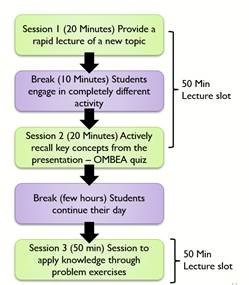By Dr Paul Hubbard, Teaching Fellow, School of Medical Education

Neuroeducation is an emerging educational discipline where a neuroscientific understanding of how the brain learns is used to drive forward current teaching methods or to develop new and innovative methods of teaching and learning. Whilst neuroeducation does not claim to be a complete solution, it is hoped that an increasing knowledge of the biology behind the process of forming memories in the brain will make teaching methods more efficient.
As this is an interesting topic area for me I decided to submit an abstract to the 2018 learning and teaching conference with the aim to raise the idea of ‘neuroeducation’ and to start a discussion as to whether techniques based on the science of learning could be used in higher education to advance teaching.
In the discussion I raised the problem that there are a number of ‘neuromyths’ prevalent in education and these have ‘muddied the water’ and tarnished the image of neuroeducation. Examples of neuromyths include the ‘right brain creative/left brain logical’ idea as well as the concept of distinct ‘learning styles’. As a result of these neuromyths there is a lot of scepticism over whether neuroscience research can be transferred to education. Current research in the field therefore aims to utilise real scientific evidence to help debunk neuromyths but also to provide an evidenced-based approach to develop techniques that tap into the brains’ own method of forming memories in order to enhance learning.
Spacing out learning over a period of time and into ‘bite-sized’ chunks is not a new idea. It has long been known that repeated learning at intervals, following an initial learning event, aids learning progress. Revisiting a topic shortly after teaching reduces the chances of forgetting information and increases the possibility of the brain forming long-term memories. I therefore decided to focus on spaced learning as a potential educational tool.
Spaced Learning is a technique that hopes to tap into the process of long-term memory formation by scheduling multiple short periods of teaching interspersed with breaks. In the breaks students complete activities that require little thought and are unrelated to the taught topic. The length of time of the teaching periods, and the breaks in teaching, are designed to consolidate learning at key points in the physiological memory formation process. Spaced learning has been tested as a teaching tool by Kelley and Whatson in 2013 and has recently been included in the Open University’s 2017 ‘Innovating Pedagogy’ report that proposed ten up-and-coming innovations in teaching that have the potential to alter educational practice.
Most studies relating to neuroeducation techniques are trialled in a school environment but very rarely get trialled in higher education. It is therefore unknown whether such techniques can be adapted for use in higher education. I therefore aim to trial a form of spaced learning during the MBBS curriculum to see if there is scope for it to be used as an educational technique in higher education. The original study on spaced learning by Kelly and Whatson used a 90 minute teaching session that included three 20 minute teaching slots separated by two 10 minute breaks. To work with the traditional 50 minute lecture based timetable I aim to run two 20 minute teaching sessions with a 10 minute break in between, followed by a second session later in the day. There is evidence of a second wave of gene activation relating to learning around 6 hours after the initial learning event so I hope to use the second session to consolidate learning from the first session. I will gain feedback will be gained from students on their experience of this style of teaching with the view that the technique could be modified and developed in the future.
For further reading, please see:
Kelley, P., & Whatson, T. (2013). Making long-term memories in minutes: a spaced learning pattern from memory research in education. Frontiers in Human Neuroscience, 7, 589. http://doi.org/10.3389/fnhum.2013.00589
The Open University (2017) Innovating Pedagogy 2017 [online] available from http://www.open.ac.uk/blogs/innovating/
Dr Paul Hubbard presented at this year’s learning and teaching conference. You can view the recap recording here and the slides are available at https://www.ncl.ac.uk/ltds/professional/conference/
If you need any further information please get in touch:
